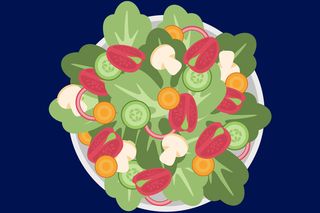
How Much Protein Do You Really Need?
Turns out, you don’t really need meat.

I’ve been non-veg my entire life. Not excessively carnivorous, per se, but a meal wouldn’t feel complete without meat. Nor should it — protein is an essential nutrient, and meat is the best, easiest way to get protein; an all-veg diet would be complicated to manage, and would risk a protein deficiency… right?
Wrong. My life is a lie. And my last real justification for eating meat — to get enough protein — crumbles. I’m well aware of the ethical arguments against supporting the exploitative and frankly disgusting production practices of animal farms. I’m also aware of the environmental toll of factory farming animals.
The medical and nutrition community are a bit at odds on whether eating meat provides the just-right amount or too much protein. But one thing is clear: It’s entirely and easily possible, and may in fact be better, to get your protein requirement from plant sources.
“Human protein needs are just a tiny percentage of calories, maybe 2.5, 3% of calories,” says Pamela A. Popper, PhD, a diet expert and founder of The Wellness Forum, in the documentary Food Choices. “If you were to eat the lowest-protein foods in the plant world, which would be foods like rice, you’re at 8 or 9% protein. So, you’re not going to become protein deficient.”
Humans need at least 0.8 grams of protein per kilogram of body weight each day at the very minimum just to keep from falling sick; this is the benchmark for people who exercise by walking, or who don’t really exercise. For anyone who exercises on a somewhat regular basis, the daily requirement is a little higher: somewhere in the range of 1.1 to 1.6 grams per kilogram. (For anyone who does serious endurance or weight training, it raises to between 1.6 to 2 grams per kilo daily.)
Because I run, indifferently and awkwardly, I’m going to guess the daily amount of protein I need is around 1.1 grams per kilogram, or 91 grams total. My breakfast cereal gives me 6 grams (if I switch to using plain Greek yogurt instead of milk, I get even more); a typical serving of paneer, chana or eggs (no chance I’ll ever go vegan) at lunch and dinner add up to roughly 33 grams; a snack of a handful of almonds is another 30 grams — that’s 69 grams so far. The protein content of most vegetables and whole grains can easily add up to the remaining 22 grams. I don’t even need to drink a protein supplement.
Plant sources of protein also provide a wide array of other nutrients that meat doesn’t. The only real additional nutrient benefit (red) meat offers, is iron. But iron can be supplemented, whether by diet or by medication, and its absorption can be ensured by getting enough protein and vitamin C.
Now, my reason to eat meat boils down to simply liking the taste of animal flesh. And while I 100% believe that’s a perfectly valid reason to eat meat (they will pry bacon from my cold, dead fingers; no one should have to give that up) it feels, personally, like a rather Lecter-light counterpoint when stacked up against the evidence that I don’t actually need it.
Liesl Goecker is The Swaddle's managing editor.
Related


Even Oedipus Thinks The Mom in ‘Helicopter Eela’ Is Messed Up
